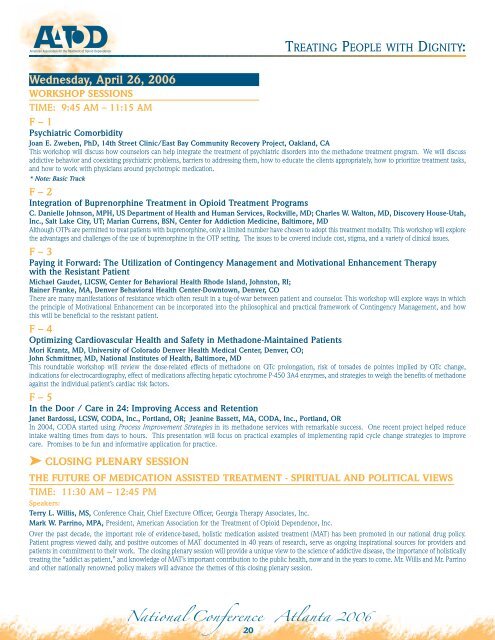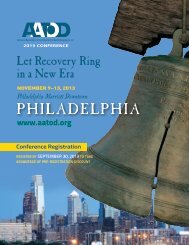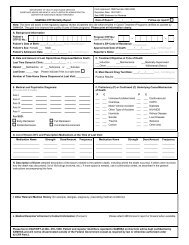AATOD 2006 Conference Registration Brochure
AATOD 2006 Conference Registration Brochure
AATOD 2006 Conference Registration Brochure
Create successful ePaper yourself
Turn your PDF publications into a flip-book with our unique Google optimized e-Paper software.
American Association for the Treatment of Opioid Dependence<br />
TREATING PEOPLE WITH DIGNITY:<br />
Wednesday, April 26, <strong>2006</strong><br />
WORKSHOP SESSIONS<br />
TIME: 9:45 AM – 11:15 AM<br />
F – 1<br />
Psychiatric Comorbidity<br />
Joan E. Zweben, PhD, 14th Street Clinic/East Bay Community Recovery Project, Oakland, CA<br />
This workshop will discuss how counselors can help integrate the treatment of psychiatric disorders into the methadone treatment program. We will discuss<br />
addictive behavior and coexisting psychiatric problems, barriers to addressing them, how to educate the clients appropriately, how to prioritize treatment tasks,<br />
and how to work with physicians around psychotropic medication.<br />
* Note: Basic Track<br />
F – 2<br />
Integration of Buprenorphine Treatment in Opioid Treatment Programs<br />
C. Danielle Johnson, MPH, US Department of Health and Human Services, Rockville, MD; Charles W. Walton, MD, Discovery House-Utah,<br />
Inc., Salt Lake City, UT; Marian Currens, BSN, Center for Addiction Medicine, Baltimore, MD<br />
Although OTPs are permitted to treat patients with buprenorphine, only a limited number have chosen to adopt this treatment modality. This workshop will explore<br />
the advantages and challenges of the use of buprenorphine in the OTP setting. The issues to be covered include cost, stigma, and a variety of clinical issues.<br />
F – 3<br />
Paying it Forward: The Utilization of Contingency Management and Motivational Enhancement Therapy<br />
with the Resistant Patient<br />
Michael Gaudet, LICSW, Center for Behavioral Health Rhode Island, Johnston, RI;<br />
Rainer Franke, MA, Denver Behavioral Health Center-Downtown, Denver, CO<br />
There are many manifestations of resistance which often result in a tug-of-war between patient and counselor. This workshop will explore ways in which<br />
the principle of Motivational Enhancement can be incorporated into the philosophical and practical framework of Contingency Management, and how<br />
this will be beneficial to the resistant patient.<br />
F – 4<br />
Optimizing Cardiovascular Health and Safety in Methadone-Maintained Patients<br />
Mori Krantz, MD, University of Colorado Denver Health Medical Center, Denver, CO;<br />
John Schmittner, MD, National Institutes of Health, Baltimore, MD<br />
This roundtable workshop will review the dose-related effects of methadone on QTc prolongation, risk of torsades de pointes implied by QTc change,<br />
indications for electrocardiography, effect of medications affecting hepatic cytochrome P-450 3A4 enzymes, and strategies to weigh the benefits of methadone<br />
against the individual patient’s cardiac risk factors.<br />
F – 5<br />
In the Door / Care in 24: Improving Access and Retention<br />
Janet Bardossi, LCSW, CODA, Inc., Portland, OR; Jeanine Bassett, MA, CODA, Inc., Portland, OR<br />
In 2004, CODA started using Process Improvement Strategies in its methadone services with remarkable success. One recent project helped reduce<br />
intake waiting times from days to hours. This presentation will focus on practical examples of implementing rapid cycle change strategies to improve<br />
care. Promises to be fun and informative application for practice.<br />
➤ CLOSING PLENARY SESSION<br />
THE FUTURE OF MEDICATION ASSISTED TREATMENT - SPIRITUAL AND POLITICAL VIEWS<br />
TIME: 11:30 AM – 12:45 PM<br />
Speakers:<br />
Terry L. Willis, MS, <strong>Conference</strong> Chair, Chief Exectuve Officer, Georgia Therapy Associates, Inc.<br />
Mark W. Parrino, MPA, President, American Association for the Treatment of Opioid Dependence, Inc.<br />
Over the past decade, the important role of evidence-based, holistic medication assisted treatment (MAT) has been promoted in our national drug policy.<br />
Patient progress viewed daily, and positive outcomes of MAT documented in 40 years of research, serve as ongoing inspirational sources for providers and<br />
patients in commitment to their work. The closing plenary session will provide a unique view to the science of addictive disease, the importance of holistically<br />
treating the “addict as patient,” and knowledge of MAT’s important contribution to the public health, now and in the years to come. Mr. Willis and Mr. Parrino<br />
and other nationally renowned policy makers will advance the themes of this closing plenary session.<br />
National <strong>Conference</strong> Atlanta <strong>2006</strong><br />
20








